How Much Creatine HCL Should I Take?
Author:
Unlock your full potential by engaging with our experts and community! Have questions about your fitness journey or looking for expert advice on weightlifting techniques? Don’t hesitate — leave a comment below and Jacek Szymanowski will provide a personalized answer and insights to help you reach your goals.
Torokhtiy is reader-supported. Some links are affiliate links, and we may earn a commission at no extra cost to you. See our disclosure page for details.
Are you wondering “How much Creatine HCL should I take?”
If you’re looking to take Creatine HCL instead of monohydrate, you may be wondering if the doses are different. The standard dose of creatine monohydrate is 3-5g a day, so is creatine HCL the same? Let’s find out.
How Much Creatine HCl Should I Take? Although brands often claim you need less Creatine HCl to get the same effects as monohydrate, this likely isn’t true. If you’re taking HCl, we recommend taking at least the same amount you would of monohydrate, which will be between 3-5g a day.
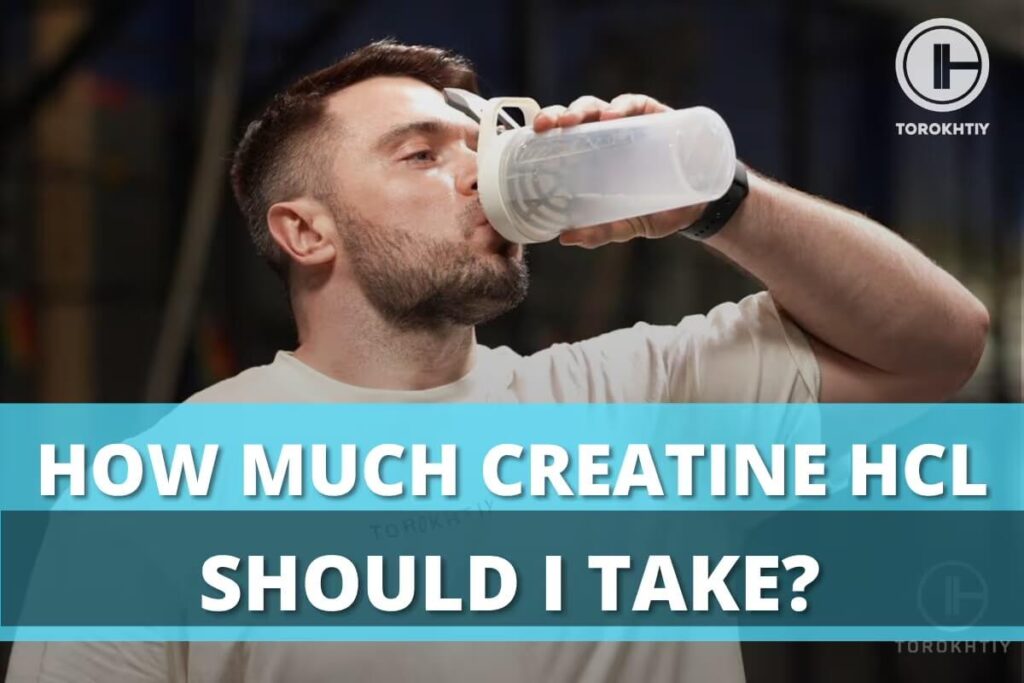
What Is Creatine HCl?
Creatine HCl – or creatine hydrochloride – is an alternative to the more standard form of creatine, monohydrate. Creatine HCl is a product of monohydrate. It’s most commonly made by mixing monohydrate with acetyl chloride as reactants with ethanol as a solvent. This produces creatine HCl as a product.
The main reason this is done is because creatine HCl is thought to be significantly more soluble than creatine monohydrate. Studies have shown that HCl is 38 times more soluble than monohydrate. However, it does not appear that this improved solubility leads to any improvement in bioavailability when compared to monohydrate.
Therefore, while this increased solubility will help HCl mix better in liquid when compared to monohydrate, it likely won’t make a difference in how much is absorbed by your body. It’s worth noting that this increase in solubility may help with the stomach discomfort some people experience when taking creatine.
The other main difference between creatine monohydrate and HCl is their price. Like most other alternative forms of creatine, HCl is significantly more expensive than monohydrate for the same basic product. So, if you’re looking for the best value for your money, we recommend sticking with monohydrate over HCl.
Overall, while Creatine HCl is one of the more popular alternatives to monohydrate available, it’s difficult to recommend it over the most standard form of creatine.

How Much Creatine HCl Should I Take?
With the common marketing claim that creatine HCl is 38 times more soluble than monohydrate, many people assume that you need less to achieve the same effects as monohydrate. Here’s why this is likely false.
As mentioned above, just because HCl is more soluble than monohydrate, it is not proven that it is more bioavailable.
From what I know there is no evidence that Cr-HCL is absorbed more effectively and promotes greater Cr retention than the same doses of CrM. So, this means you will need at least the same amount of HCl to get the same effects as monohydrate.
A standard dose of monohydrate is between 3-5g, so a dose of HCL should be within this range as well.
creatine dosage calculator
Loading Phase:
Maintenance Phase:
One often overlooked factor when considering this is that creatine HCl is not as pure a form of creatine as monohydrate. Creatine HCl is a monohydrate mixed with acetyl chloride, meaning it has a lower creatine percentage when compared to monohydrate. Monohydrate has around 87.9% creatine, while HCl has around 78.2%.
This is why in theory you might need slightly more HCl to receive the same effects as monohydrate but we can’t definitely say that yet without properly done research.
3-5g of HCl should still be sufficient to get the desired effects from creatine. Ultimately, this whole speculation and the difference in creatine concentration is just another reason why standard monohydrate is a better option when compared to HCl.
Overall, Creatine HCl should most likely be taken at a similar dose to creatine monohydrate. While HCl does have a lower creatine concentration, it won’t affect the dosing too significantly. A daily Creatine HCl dosage of 3-5g should deliver the same cumulative effects as monohydrate if taken consistently.

Unproven Claims About Creatine HCl
1. 38 Times Higher Bioavailability Than Monohydrate
Although Creatine HCl does appear to have much better solubility than monohydrate, this statistic is often conflated with bioavailability. Better solubility means that HCl will dissolve smoother in a liquid, but it does not mean your body will absorb it any better. Current research suggests that the bioavailability of HCl and monohydrate is roughly the same.
While it may seem like these 2 factors are related, in reality, they have little to do with one another. If you ever see branding suggesting that better solubility will improve bioavailability, you now know that in this case it’s false.
2. Same Efficacy With A Much Lower Dosage
Another common misconception about creatine HCl is that you need less of it to get the same effects as monohydrate. This ties in with the unproven claim about bioavailability. Because people assume HCl is more bioavailable than monohydrate, they also assume less is needed for the same results.
As mentioned above, Creatine HCl is not absorbed more effectively than monohydrate. On top of this, it is a slightly less pure form of creatine, meaning in theory you might need a bit more to get the same effects. While a standard dose of 3-5g a day will still likely be sufficient for HCl (at least studies show it produces the same effect as 3-5g of CrM), this is certainly not less than a standard dose of monohydrate. So, anybody claiming that 1-2g of HCl is an equivalent of 3-5g of monohydrate is likely mistaken.
What Is The Most Studied And Most Affordable Form Of Creatine (Sorry, It’s Not HCl)
As you’ve probably already figured out, Creatine HCl is not the best form of creatine on the market. Based on current research, that title belongs to Creatine Monohydrate 100% of the time.
As covered throughout this article, while HCl has better solubility, monohydrate and HCl have probably nearly identical bioavailability. With this being said, there are several other reasons monohydrate is a better option: price and research.
First, creatine HCl is often sold for nearly 3 times as much as monohydrate. Especially considering there are no major advantages to HCl over monohydrate beyond solubility, this price is hard to justify.
On top of this, there is significantly more research backing up the safety and efficacy of monohydrate as opposed to HCl. While HCl is likely completely safe, monohydrate has been studied for decades, while HCl is a relatively new invention.
Overall, monohydrate is the most heavily researched form of creatine, making it still the safest option out of all the creatine variations available.
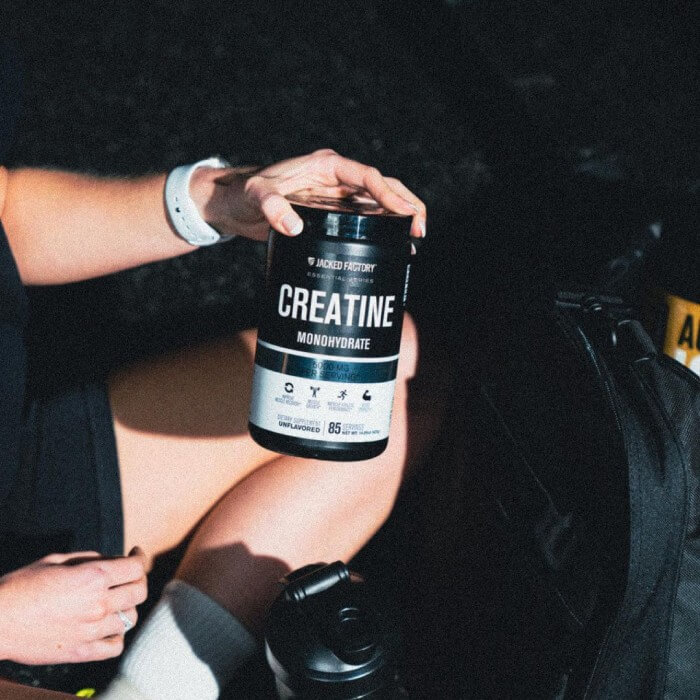
So, while HCl will deliver similar effects to monohydrate, it is significantly more expensive and less studied. There are studies that show monohydrate is safe for prolonged use, while no such studies exist for HCl. While increased solubility is nice, it’s likely not worth these obvious downsides when compared to monohydrate.
If you’re interested in a high-quality monohydrate supplement, check out Jacked Factory’s Creatine.
Kaged Creatine HCl
- Serving Size: 1 scoop (1003 mg)
- Servings per Container: about 75
- Creatine HCL per serving: 750 mg
- Recommended By Athletes: Davey Fisher, Tawna Mccoy
While we strongly recommend monohydrate, you may still want to take Creatine HCl. While the vast majority of people should choose monohydrate, the main reason we would recommend HCl instead is if monohydrate causes stomach discomfort for you. In this case, you may be interested in trying Kaged’s HCl.
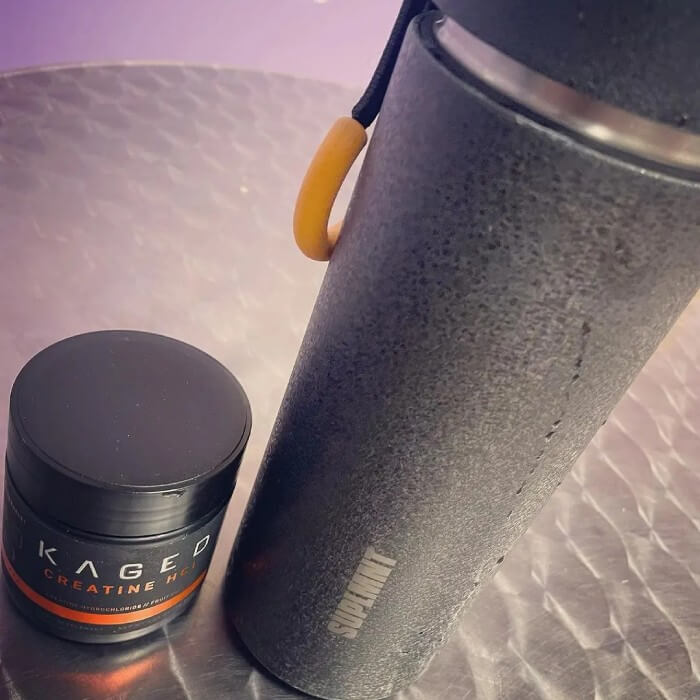
Each scoop of this HCl contains 750mg making it much less than a standard 5g dose of monohydrate. You may be wondering, “Is 750 mg of creatine HCl enough?” This is not nearly enough, as you would need to take around 4-7 times this much to get enough to saturate your muscles. This low dose is misleading marketing claiming that less is needed for the same effects.
With this all being said, this is also one of the rare creatine supplements that has flavored options. On top of the standard unflavored variety, you can get your daily dose of creatine HCl in fruit punch and lemon-lime as well.
In terms of price, Kaged’s HCl isn’t as expensive as many others on the market. However, at around $0.47 per serving, it’s way more expensive than a standard monohydrate product considering the very low serving size.
FAQ
How Many Grams Of Creatine HCl Should I Take A Day?
Because creatine HCl is a slightly less concentrated form of creatine than monohydrate, you would need to take at least the same amount to the same effects. So, if you’re wondering how many grams of creatine HCl a day is necessary, a standard dose of 3-5g should be sufficient for most people.
Is 4 Grams Of Creatine HCl Too Much?
No, 4g is a moderate creatine HCl dosage per day that you could take for optimal effects. As mentioned above you will need at least a similar dose to receive the same effects. Using Kaged’s HCl as an example, some creatine HCl products come in a dose of as low as 750mg, making monohydrate a much easier way to get creatine in.
Is 1000 Mg Of Creatine HCl Enough?
It depends how much you get from food, but you will likely need a creatine hydrochloride dosage of much more than 1000mg (or 1g) a day to see any noticeable effects. We recommend taking a dose of 3-5g a day, with the higher end of this range likely being ideal.
How To Take Creatine HCL?
Taking creatine HCl is as simple as mixing a scoop into a glass of water and stirring it up. Because it is highly soluble, you shouldn’t have any problems with poor mixability.
Conclusion
While creatine HCl likely won’t be many people’s first choice over monohydrate, for those who experience stomach discomfort when taking creatine, it may be a good alternative for its enhanced solubility. Because it’s slightly less concentrated than monohydrate, you’ll need to take slightly more for the same effects. With that being said, a 3-5g dose daily should be sufficient for most people.
If you’re interested in trying creatine HCl, we recommend going with Kaged’s HCl, just be aware of its incredibly low dose. If you’d prefer monohydrate instead, consider trying Jacked Factory’s Creatine.
Were you aware of the differences between HCl and monohydrate? Did you know you need more HCl to receive the same effects? Let us know your thoughts in the comments below!
Also read:
- Types of Creatine
- Why Is Creatine So Expensive
- Does Creatine Expire
- Can You Take Creatine While Cutting
- What Happens if You Miss a Day of Creatine
- Can You Take Creatine Without Working Out
- Does Creatine Make You Stronger
- Glutamine vs Creatine
- Creatine Nitrate vs Monohydrate
References:
- Richard B Kreider, “International Society of Sports Nutrition position stand: safety and efficacy of creatine supplementation in exercise, sport, and medicine”, Biomedcentral, https://jissn.biomedcentral.com/articles/10.1186/s12970-017-0173-z, 13 June 2017
- Daniel McDonough, “ORAL CREATINE HYDROCHLORIDE SUPPLEMENTATION”, Boisestate, https://scholarworks.boisestate.edu/cgi/viewcontent.cgi?article=2454&context=td, December 2017
- Brandon T. Gufford, “Physicochemical Characterization of Creatine N-Methylguanidinium Salts”, Tandfonline, https://www.tandfonline.com/doi/full/10.3109/19390211.2010.491507, 10 Aug 2010
- Richard B. Kreider, “Bioavailability, Efficacy, Safety, and Regulatory Status of Creatine and Related Compounds: A Critical Review”, MDPI, https://www.mdpi.com/2072-6643/14/5/1035#B198-nutrients-14-0103528 February 2022
- Guillermo Escalante, “Analysis of the efficacy, safety, and cost of alternative forms of creatine available for purchase on Amazon.com: are label claims supported by science?”, Sciencedirect, https://www.sciencedirect.com/science/article/pii/S2405844022034016,December 2022
Why Trust Us?
With over 20 years in Olympic weightlifting, strength training, nutrition coaching, and general fitness our team does its best to provide the audience with ultimate support and meet the needs and requirements of advanced athletes and professional lifters, as well as people who strive to open new opportunities and develop their physical capabilities with us.
By trusting the recommendations of our certified experts in coaching, nutrition, and sports training programming, as well as scientific consultants, and physiotherapists, we provide you with thorough, well-considered, and scientifically proven content. All the information given in the articles concerning workout programming, separate exercises, and athletic performance, in general, is based on verified data.
The product testing process is described in more detail here.
Author: Jacek Szymanowski
Certified Nutritionist,
M.Sc.Eng. Biotechnology
Performance Architect,
Strength and Conditioning Specialist
With over 30 years of fighting experience, specialization in nutrition coaching for athletes, and expertise in metabolic health and dietary strategies, Jacek offers a comprehensive approach to optimizing your performance and well-being. Backed by a Master of Science degree in Biotechnology, Jacek remains at the forefront of scientific advancements, ensuring that his coaching is always evidence-based and up-to-date.



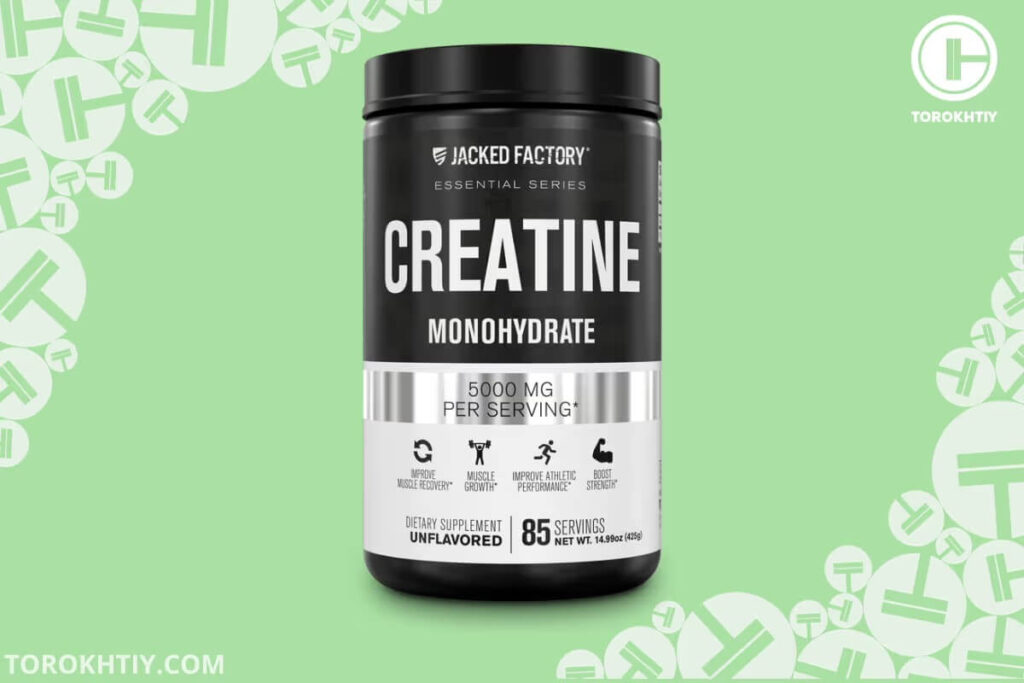
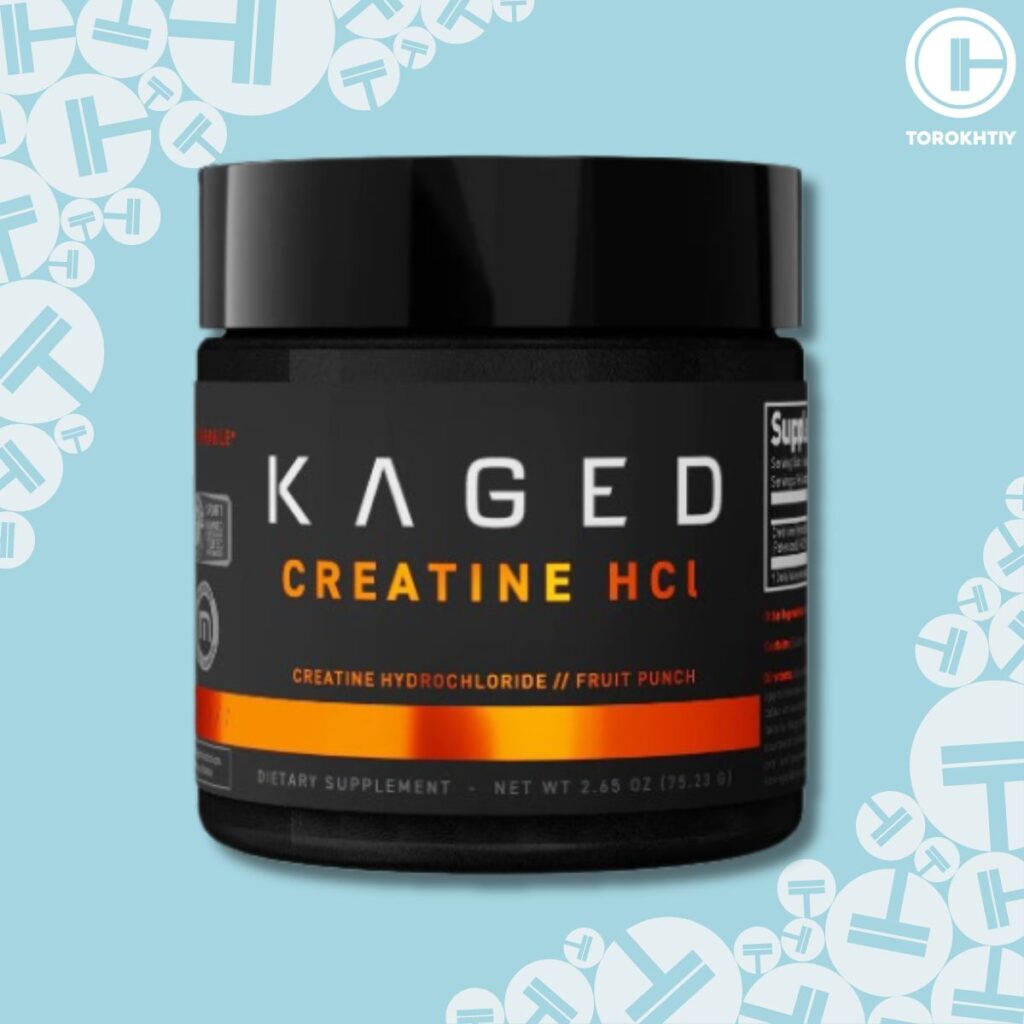
Still have questions after reading our article? Unlock your full potential by engaging with our experts and community! Don’t hesitate — leave a comment below and Jacek Szymanowski will provide a personalized answer and insights to help you reach your goals.